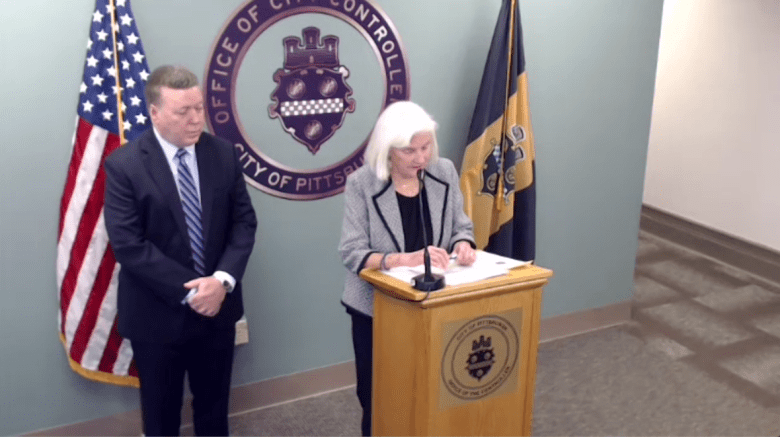Update (5/27/22): Pittsburgh’s Department of Public Safety announced Friday that Police Chief Scott Schubert would retire. Schubert, a longtime Pittsburgh policeman, became chief in 2017 under then-Mayor Bill Peduto.
Mayor Ed Gainey ran for office on police reform and promised to mend the relationship the bureau with the city’s neighborhoods. At the start of his administration, he replaced the city’s Public Safety director but left Schubert in place. Last week, Gainey’s transition committee released its report on public safety, which explicitly called for change atop the Bureau of Police. Gainey said Friday that he did not ask Schubert to leave.
The joint audit described in this story did not directly address Schubert. Gainey said Friday that a national search for a new chief would commence, “centered around the voices of community members,” and take approximately six months.
Mayor Ed Gainey has not done much to change the Pittsburgh Bureau of Police in his first five months in office, but a new audit conducted jointly by the city controller’s office and the Citizen Police Review Board [CPRB] provides a proposed blueprint of sorts.
A review set in motion by a 2020 voter referendum, the audit contains 23 concrete recommendations touching various parts of the department. Many focus on addressing the racial disparities in Pittsburgh’s policing and increasing transparency around use of force and officer complaints.
“We don’t need to recreate the wheel,” to improve the police bureau, said CPRB director Beth Pittinger in a press conference Tuesday. “We have the ability now.”
The audit includes a written response by Deputy Police Chief Thomas Stangrecki. Stangrecki wrote “Agreed” in response to 15 of the 23 suggestions, “Agreed in part” to six of them and “Disagreed” to one, which called for certain compliance checks to be moved to an independent agency.
Pittinger cautioned that even with broad agreement from police officials, external factors like state and federal law and union contracts can slow implementation.
Gainey’s spokesperson Maria Montaño told PublicSource in an email that the audit recommendations will “serve as guideposts for us as we finalize our plans” on policing, along with the recently-released transition report and feedback from community meetings. She said the administration “looks forward to releasing our plans in the coming weeks.”
A Public Safety Department Spokesperson said she was not sure if department leaders had seen the audit. The police officers’ union spokesperson did not respond to requests for comment.
Use of force
The auditors found that in 61% of use-of-force incidents in 2020, the civilian was Black. This rate is disproportionate to the city’s population, which is about 22% Black. The same trend is evident in arrests and traffic stops.
The audit suggests several ways to give the public a clearer view into the police bureau.
- It recommends the bureau disclose the numbers of officers who have been involved in various numbers of use-of-force incidents. “This could show which officers are prone to using excessive force,” the report says.
- It suggests a similar breakdown of complaints made against officers, “showing outlier officers” to improve transparency.
- It urges the use of a new data management system to give the public a comprehensive view of how arrests, traffic stops, use-of-force encounters and other incidents are distributed across neighborhoods and demographics.
The auditors commended the department for requiring officers to participate in annual “continuous education training” on use of force and de-escalation and urged the department to continue the practice. The audit noted that the bureau is in the process of improving data analysis by adopting new IT systems by Inform RMS and IAPro, replacing “ineffective software” developed by B-Three Solutions. That firm was the subject of a 2018 PublicSource series that focused on concerns with its implementation.

The auditors warned that one police accountability tool, body-worn cameras, may not be living up to their potential as a labor dispute has put the brakes on compliance checks for the devices.
The camera program requires officers to turn on their cameras before certain encounters with civilians and the footage is retained for months or even years depending on the outcome. But a complaint lodged by the police officers’ union has halted compliance checks meant to ensure that officers are turning on the cameras at the appropriate times. The auditors recommend that the department come to an agreement with the union so compliance checks can resume.
Marijuana
The auditors found stark disparities in marijuana-related enforcement in 2020, and attributed that to an ambiguous, two-track enforcement system in place since 2016.
Since the city decriminalized possession of small amounts of marijuana six years ago, the police bureau has given officers the option of charging offenders with a non-criminal city fine of as little as $25, or with the criminal state offense which can lead to jail time.

Of those hit with the state-level criminal charge for marijuana possession in 2020, 85% were Black, according to the audit.
“That shows there’s a need to change,” Controller Michael Lamb said. “That shows an inequity.”
The auditors wrote that the department issued an informal notice to its officers at the start of 2021 to default to using the city non-criminal citation unless other law enforcement issues are present, but left discretion to the officers. “To reduce racial disparities in the administration of the marijuana decriminalization ordinance, [the bureau] should issue a formal policy providing guidance on when officers should follow the city code’s decriminalization ordinance as opposed to the state offense,” the auditors wrote.
Traffic stops
The auditors urged a move to “encounter-free traffic enforcement” to reduce the risk of minor violations leading to violent encounters between police and stopped motorists, most of whom tend to be Black.
Pittsburgh City Council passed a law late last year banning traffic stops for minor violations like a singular broken tail light or an expired registration. But city councilors and members of the public raised questions about whether the move is allowed under state law and how minor violations will be addressed without traffic stops.
In his response to the audit, Stangrecki wrote that “The Pennsylvania Law Enforcement Accreditation Commission has notified the Bureau of Police that our accreditation status is in jeopardy for restricting the enforcement of certain traffic violations.” Accreditation is an optional way for police agencies to evaluate and improve their practices.
Hiring
The bureau’s use of polygraph tests in its hiring process was a point of disagreement between Stangrecki and the auditors, who recommended the bureau stop using the tests.
The audit notes that polygraph tests have been “disputed by the scientific community” and that most employers are prohibited from using them in hiring under a 1998 law. Stangrecki countered by writing that the polygraph is the only way to measure a candidate’s “core values such as integrity and honesty.”
As an alternative, the auditors suggested creation of a community member panel to assess candidates. Stangrecki wrote that the bureau would not be opposed to incorporating the idea.
The auditors made two recommendations around screening for involvement in hate groups and paramilitary groups. They called for a clear policy banning officer involvement in such groups and a clear plan for instances in which affiliations are found, including termination.
In November, the city announced that its Office of Municipal Investigations was reviewing a police lieutenant with ties to the far-right paramilitary group The Oath Keepers.
Charlie Wolfson is PublicSource’s local government reporter and a Report for America corps member. He can be reached at charlie@publicsource.org and on Twitter @chwolfson.
Keeping local government accountable to you is our job at PublicSource. Civic Briefs is an ongoing series to share more important news and information with you in real time.







